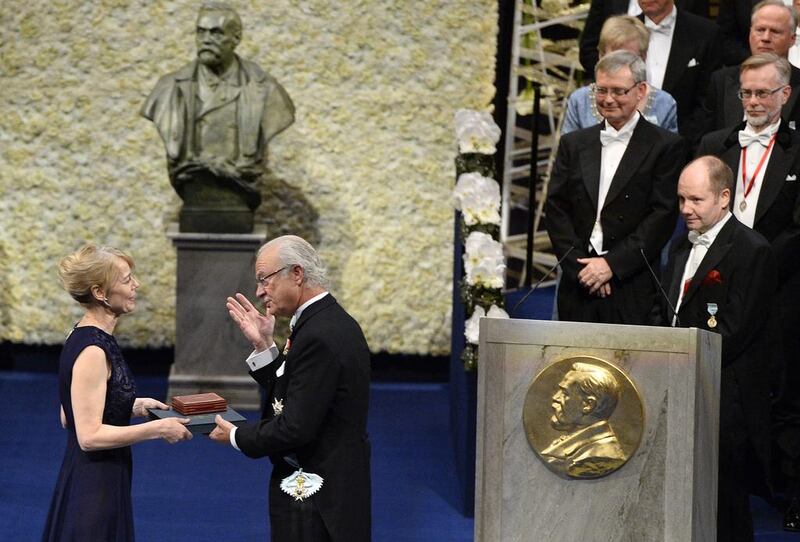It is the world’s most prestigious literary prize, steeped in history, heritage and secrecy. Its winners are a roll call of the finest writers to have ever lived.
But what’s it like to be part of the team that selects the Nobel Prize in Literature? What are the challenges it faces? And what are the chances of a UAE writer winning the grand prize?
Ahead of his talk at the Abu Dhabi International Book Fair, Professor Kjell Espmark, a member of the Swedish Academy since 1981 and Nobel Prize Committee from 1988 and himself a novelist and poet, gives a rare insight into the inner workings of literature’s ultimate honour.
Alfred Nobel’s will stipulated that the winner of the prize must have produced the most outstanding work in an ideal direction with political issues not allowed into the picture. But this brings its own challenges.
“The problem is the interpretation of ‘ideal’. And each new generation of the Swedish Academy has interpreted the idea according to its view of literature,” says Prof Espmark.
This has produced different results. The 1930s favoured books for the ordinary reader. However, the next generation, in the 1940s, reacted against this by preferring “pioneers” – those who paved the way for new outlooks and form. This gave way to the “unknown masters” period from the late 1970s, when unnoticed writers, who had not received recognition, were prioritised. Another period developed in the 2000s, when the academy paid attention to exponents of “witness literature”.
“There is, however, an interplay of the criteria that appeared from the 1940s to the present. Practice has varied between the pioneers, unknown masters and representatives of the literary testimony. By this variation, the academy verdicts retain their classical character of the unpredictable,” he says.
However, that is about as much as Prof Espmark, who also served as chairman of the Nobel Committee from 1988 to 2004, will reveal – given that nothing must be made public for 50 years following the decision about a prize.
He is more forthcoming about areas of concern, though. One of the big dangers is the chance that younger writers could be neglected, he cautions. “The international nominating system tends to put forward only well-established names. So there is a danger that strong, developing, younger talents are passed over.”
Prof Espmark also expresses concern about the availability of translated work. “Works in translation constitute only a small percentage (2.7 to 2.8) of book publication in the US, whereas a substantial part of publication in Europe is foreign literature. The international literary dialogue suffers from such inequality.”
Turning to the Middle East, Prof Espmark says there have been a number of eminent orientalists on the committee and when it comes to commissioning translations, the region is no exception.
So what are the chances of a UAE writer walking away with the grand prize? “A strong writer from the UAE has the same chance as any strong colleague from other parts of the world. The prize is never given to a country, nor to a language. It is given to an excellent writer who happens to be a citizen of a specific country and to write in its specific language.”
While Prof Espmark says the Nobel has no rival, many regional prizes have developed over the past few years. The International Prize for Arabic Fiction and the Sheikh Zayed Book Award are among the most notable in the Middle East.
So how effective are literary prizes? And how do they relate to the literary scene in UAE? Well placed to examine this is Saad Albazei, professor of English at King Saud University in Riyadh.
“Literary prizes encourage writers to be more productive. They offer incentives, not only financially but morally and symbolically. However, prizes sometimes carry unannounced political or ideological objectives by encouraging certain types of literature,” he says.
“Prizes are useful. They are certainly useful to the recipient and often to the audience, who can see in them directions as to what is valuable and should be read.”
The Abu Dhabi book fair is just one of several held throughout the year to promote literature in the country and prizes for regional writers have been on the increase. There are several reasons for this, according to Prof Albazei.
“A number of factors have contributed to this rise: increased wealth, the willingness to promote culture, competition among the Gulf states and an insistence on making the Gulf an Arab cultural centre along with Cairo and Beirut.
“A prize can become an impediment against better work as the writer is challenged to stay on the same level. Not all writers can stay the course.”
Prof Albazei, also a member of the Shura Council in Saudi Arabia, says the literary scene in the GCC is vibrant and he praises the talent, particularly that of the poets in the UAE.
“The poets are among the best the Gulf has offered so far. I should particularly mention the late poet, Ahmed Rashid Thani, whom we lost recently – one of the best poets in the region and whom I met at the last book fair in Abu Dhabi. There is also the female poet Nujoom Al Ghanem, a notable literary presence, in film as well, among others.”
The Abu Dhabi book fair has swiftly become one of the most important in the region. What are Prof Albazei’s impressions of the event? “It may not be the biggest in the region in terms of size [the number of publishers and books]. But it has been and continues to be one of the best in term of cultural value.”
• On Thursday, Professor Kjell Espmark will talk on The Whys and Why-nots of the Nobel Prizes on the Discussion Sofa at 6.30pm. At 9pm, Dr Saad Albazei will be on the Discussion Sofa with Dr Saeed Al Saeed and Ali Abdalaha Khalifa speaking about Literary Prizes in the GCC. Prof Espmark will discuss his own writing on Saturday at 5.45pm in The Tent






